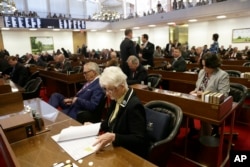Lawmakers in the southern state of North Carolina are facing increasing pressure from high-profile businesses and activists to repeal a landmark bill called "shameful" for preventing anti-discrimination protections for transgender people.
The battle over the bill is part of a larger national discussion about the conflict between public privacy and safety and the individual rights of transgender people. Democratic presidential candidate Hillary Clinton said she and her supporters "reject discrimination against LGBT people like the shameful law passed in North Carolina."
The legislation, referred to as the "bathroom bill," directs public schools, agencies and universities to designate bathrooms and locker rooms for use by people based on their biological sex. Transgender people can only use bathrooms matching their preferred gender identity if they have had their birth certificates changed to reflect their transition.
Private schools and businesses are still allowed to make their own determinations regarding bathrooms and locker rooms, but the bill prevents city and local governments from establishing their own regulations for public and employment accommodations of transgender people.
"Legislation was passed to protect men, women and children when they use a public restroom, shower or locker room," Governor Pat McCrory said in a statement Tuesday. "That is an expectation of privacy that must be honored and respected."
McCrory called a Charlotte, North Carolina, city ordinance allowing transgender people use of any bathroom they choose "a radical breach of trust and security under the false argument of equal access."
Rush to passage
Critics say the legislation was passed without ample time for review, public comment or discussion in the legislature.
The bill was introduced last week, and was passed by the North Carolina House of Representatives by a vote of 82-26 that same day after three hours of debate. The bill was passed in the Senate, 32-0, last Wednesday after 11 Democratic legislators walked out in protest. McCrory immediately signed the bill into law.
"The fact that this had to be moved and rushed so quickly really shows what it's really about, which is politics," said the Rev. Rodney McKenzie Jr., director of the Academy for Leadership and Action at the National LGBTQ Task Force.
"To have a law that doesn't allow folks to use the bathroom that really matches who and what they are is harmful and it's dangerous," McKenzie told VOA.
McKenzie is in North Carolina working with faith communities to oppose the bill. He said he's met with people in North Carolina who are surprised the state government decided to prioritize passing an "unnecessary and unfair" bill.
But supporters of the bill say it fairly provides for protections of transgender people if they have made the transition and had it documented.
"Separate facilities have always corresponded to the very obvious biological differences between men and women," said Dr. Chad Pecknold, an associate professor at the Catholic University of America, who studies the intersections between religion and culture.
"The policies are designed to protect the privacy related to our bodies and biological differences in our bodies," he told VOA.
Pecknold said the bill also respects sexual abuse victims who are deeply concerned about their safety in public places.
Business pressure
A number of high-profile businesses have openly criticized the bill — including American Airlines, which employs more than 14,000 people in North Carolina. Apple, Dow Chemical and other software and medical companies with bases in North Carolina have issued statements on social media threatening boycotts in support of transgender rights. The National Basketball Association and the National Collegiate Athletic Association indicated they may move sporting events to venues outside North Carolina in protest.
Pecknold said business pressures disrupt the democratic process.
"Big business has become very aggressive in usurping democratic debate — Facebook and Google and Apple using economic threats to force democratic government's hand is, I think, politically destructive. This is the kind of thing that should worry Americans," he said.
Attorney General Roy Cooper — McCrory's Democratic challenger in elections this fall — said the bill will "set North Carolina's economy back if we don't repeal it."
His office has said it will not challenge a federal discrimination lawsuit pending against the legislation.
"The governor has signed statewide legislation that puts discrimination into the law," Cooper said.
Several mayors and state governors, including District of Columbia Mayor Muriel Bowser, have banned government employees from official travel to North Carolina in protest against the bill.
The language in the bill does not specify how the law would be enforced or if there are penalties for violators.
Georgia's Republican governor vetoed a similar "bathroom bill" Monday. Businesses in Mississippi are protesting a bill sent to that state's Republican governor Friday allowing government employees and private businesses to deny services to same-sex couples based on their religious beliefs. A spokesperson for Governor Phil Bryant said he has not yet decided if he will sign the bill.





